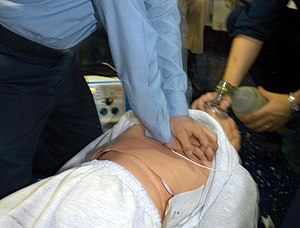Cardiac arrest
| Cardiac arrest | |
|---|---|
| Synonyms | cardiopulmonary arrest, circulatory arrest, sudden cardiac arrest (SCA), sudden cardiac death (SCD) |
 |
|
| CPR being administered during a simulation of cardiac arrest. | |
| Classification and external resources | |
| Specialty | Cardiology |
| ICD-10 | I46 |
| ICD-9-CM | 427.5 |
| DiseasesDB | 2095 |
| MeSH | D006323 |
Cardiac arrest is a sudden stop in effective blood flow due to the failure of the heart to contract effectively. Symptoms include loss of consciousness and abnormal or absent breathing. Some people may have chest pain, shortness of breath, or nausea before this occurs. If not treated within minutes, death usually occurs.
The most common cause of cardiac arrest is coronary artery disease. Less common causes include major blood loss, lack of oxygen, very low potassium, heart failure, and intense physical exercise. A number of inherited disorders may also increase the risk including long QT syndrome. The initial heart rhythm is most often ventricular fibrillation. The diagnosis is confirmed by finding no pulse. While a cardiac arrest may be caused by heart attack or heart failure these are not the same.
Prevention includes not smoking, physical activity, and maintaining a healthy weight. Treatment for cardiac arrest is immediate cardiopulmonary resuscitation (CPR) and, if a shockable rhythm is present, defibrillation. Among those who survive targeted temperature management may improve outcomes. An implantable cardiac defibrillator may be placed to reduce the chance of death from recurrence.
In the United States, cardiac arrest outside of hospital occurs in about 13 per 10,000 people per year (326,000 cases). In hospital cardiac arrest occurs in an additional 209,000 Cardiac arrest becomes more common with age. It affects males more often than females. The percentage of people who survive with treatment is about 8%. Many who survive have significant disability. Many U.S. television shows, however, have portrayed unrealistically high survival rates of 67%.
...
Wikipedia
